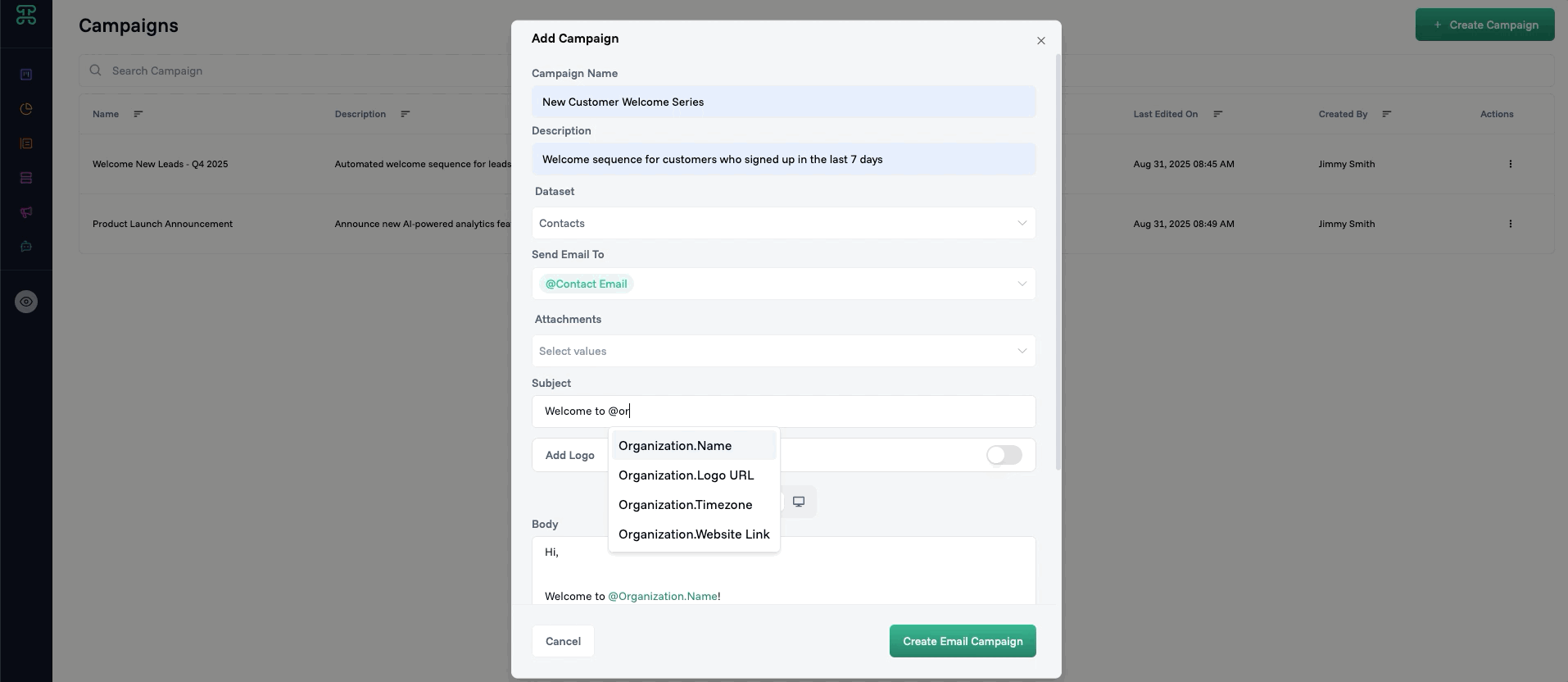Introduction
Every business struggles with the same relationship challenge—transforming scattered customer data into meaningful, ongoing connections that drive growth. Teams have spreadsheets full of contact information, datasets tracking customer behavior, and systems recording every business interaction, yet these rich insights never translate into the systematic relationship building that separates thriving businesses from struggling ones. Meanwhile, competitors build lasting customer relationships through consistent, relevant communication while your valuable customer data sits unused, and opportunities for deeper engagement slip away daily.
Proma Campaign transforms this missed potential into systematic relationship building—turning your existing business data into personalized communication that strengthens customer connections automatically. Instead of generic email blasts disconnected from your business reality, create campaigns that reference current project status, acknowledge recent purchases, and respond to actual customer behavior recorded in your systems. It's about leveraging everything you already know about your customers to build stronger relationships, ensure no opportunity for connection gets missed, and create communication that feels personal because it's based on real business context.
What is Proma Campaign?
Proma Campaign is an intelligent relationship-building system that transforms your business data into personalized customer communications. Unlike traditional email marketing tools that treat contacts as isolated email addresses, Proma Campaign understands your customers as complete business relationships with history, context, and ongoing interactions.
The campaign system enables you to create communication that feels genuinely personal because it's built on real business knowledge—recent orders, project milestones, account status, and interaction history. Whether nurturing new leads with relevant information, updating customers on project progress, or maintaining relationships through value-driven content, campaigns provide the systematic relationship foundation that growing businesses require.
Getting Started
Accessing Campaign
Campaign creation begins within any system in your Proma workspace where you have customer or contact datasets. Navigate to the campaign section and select "Add Campaign" to open the comprehensive campaign builder that guides you through creating professional email communications.
The campaign interface provides a structured approach to email creation, ensuring you configure all necessary elements—from audience selection to message content—before launching your communication efforts.

Build Your First Campaign in 5 Minutes
Let's create a welcome campaign for new customers. You'll see exactly how Proma Campaign works by building something you can use immediately.
Step 1: Start Your Campaign
Navigate to any system in your Proma workspace that contains customer data
Click the "Campaigns" tab in the top navigation
Select "Add Campaign" - this opens the campaign builder
Name your campaign: "New Customer Welcome - [Month Year]"
Add a description: "Welcome sequence for customers who signed up in the last 7 days"
Why this matters: Clear naming helps your team manage multiple campaigns and track performance over time.
Step 2: Connect Your Data
Choose your dataset from the dropdown - select the one containing your customer information
Set "Send Email To" by selecting your email field (usually "email" or "contact_email")
Pro tip: If you see more recipients than expected, you'll filter this down in the next step.
Step 3: Target the Right People
Now we'll filter to only new customers:
Click "Add Condition" under Target Conditions
Select your date field (like "signup_date" or "created_date")
Choose "is after" from the dropdown
Enter a date 7 days ago (Proma will suggest the format)
Watch your audience number drop to show only recent signups
Example: If today is March 15th, enter March 8th to target customers from the last week.
Step 4: Write Your Welcome Email
Subject Line: Welcome to @Organization.Name, @CustomerName !
Email Body:
Hi,
Welcome to @Organization.Name! I’m excited you joined us. Within the next 24 hours, you’ll get your setup guide and we’ll review your account for quick wins. This week, I’ll share our Quick Start checklist to help you see results fast, and you’ll also get an invite to our Friday Q&A at 2 PM. If you have any questions, just reply—I read every response. Best, [Your name] [Your title]

Notice the @CustomerName variables? Proma automatically replaces these with actual customer names from your dataset.
Step 5: Add Your Branding
Enable "Include Logo" if you want your company logo at the top
Preview your email by clicking "Preview Campaign"
Check how it looks with real customer data - you'll see actual names populated
Watch the "Total Audience" counter update to show how many people match your criteria
Step 6: Send Your Campaign
Click "Send Campaign" when you're ready
Confirm your audience size looks correct
Hit "Confirm Send" to deliver immediately
Or schedule it: Click "Schedule" instead to send at a specific time.
Your Campaign is Live
Congratulations! You just created and sent your first Proma Campaign. Here's what happened:
Proma pulled current data from your customer dataset
Personalized each email with individual customer names and details
Delivered professional emails to exactly the right audience
Started tracking performance automatically
Proma vs. Other Email Systems
Aspect | Proma | Mail chimp | HubSpot | SendGrid |
Quick Start Quality | ✅ 5 minutes | ⚠️ 30 minutes | ⚠️ Complex | ❌ Technical |
Real Examples | ✅ Complete | ⚠️ Generic | ✅ Good | ❌ None |
Value Proposition | ✅ Clear | ⚠️ Feature-focused | ✅ Good | ❌ Technical |
Troubleshooting | ✅ Practical | ✅ Good | ✅ Good | ⚠️ Basic |
Campaign Management Dashboard
Access all your campaigns from the main Campaigns view:
Search campaigns by name or description
See campaign status (Draft, Sent, Scheduled)
Track performance with click-through rates and opens
Edit campaigns before sending or create new versions
Delete old campaigns you no longer need

Troubleshooting Your First Campaigns
"My audience size is 0"
Check your date format matches your dataset
Verify the field names exist in your chosen dataset
Try removing conditions one by one to isolate the issue
"Personalization isn't working"
Ensure field names match exactly ({{first_name}} not {{firstname}})
Check that your dataset contains the fields you're referencing
Preview the campaign to see actual data population
"Emails went to spam"
Avoid words like "free," "urgent," "limited time"
Include your business address in email footer
Start with smaller audiences to build sender reputation
Why This Approach Works
Traditional email marketing requires constant list management, manual personalization, and disconnected tools. Proma Campaign eliminates busywork by connecting directly to your business data, ensuring campaigns always reflect current customer information while scaling personal communication across your entire customer base.
Every campaign you build becomes a reusable template. Your "New Customer Welcome" campaign will automatically target future signups. Your "Win-Back" campaign can run monthly to re-engage inactive users. You're building a systematic communication engine that works while you focus on growing your business.
Best Practices
Design Principles
Start Simple — Your first campaign doesn't need to handle every possible scenario. Build the core message that resonates with 80% of your audience. Add complexity incrementally as you understand recipient behavior and identify real engagement patterns.
A customer welcome campaign might start with just a friendly greeting and key next steps. Once that performs well, add segmentation for different customer types, personalized product recommendations, and multi-email sequences.
Focus on Value First — Every campaign should provide genuine value to recipients beyond just promotional messaging. Share helpful resources, industry insights, or exclusive content that makes opening your emails worthwhile.
Test Before You Scale — Always test campaigns with a small audience segment before sending to your entire list. Check personalization accuracy, verify all links work, and ensure emails display properly across different devices and email clients.
Content Excellence
Write Compelling Subject Lines — Subject lines determine whether recipients open your emails. Use personalization, create curiosity, or clearly communicate value. Avoid spam trigger words and excessive punctuation that can hurt deliverability.
Examples:
"@customer.name, your account setup is complete"
"New features that save you 2 hours per week"
"Exclusive insights from your industry peers"
Personalize Beyond Names — Use dataset information to create genuinely relevant content. Reference recent purchases, account activity, or business context rather than just inserting names into generic templates.
Clear Call-to-Action — Every campaign should have one primary action you want recipients to take. Make it obvious, compelling, and easy to complete. Use action-oriented language and contrasting button colors.
Audience Strategy
Segment Thoughtfully — Create audience segments based on meaningful business criteria rather than arbitrary demographics. Segment by behavior, purchase history, engagement level, or customer lifecycle stage.
Respect Frequency Preferences — Different audience segments have different tolerance for email frequency. New customers might appreciate daily onboarding emails, while long-term clients prefer weekly or monthly updates.
Maintain List Hygiene — Regularly clean your email lists by removing bounced addresses, unengaged recipients, and invalid contacts. Poor list quality hurts deliverability for all campaigns.
Next Steps
Explore related Proma features that enhance design capabilities:
@Automation Engine - Connect your custom designs to automated workflows that respond to user interactions
@Smart Columns - Add intelligent, computed fields that enhance your template data sources
@Interfaces - Build complete application interfaces that incorporate your custom card designs
Have questions? Our team is ready to help at support@proma.ai